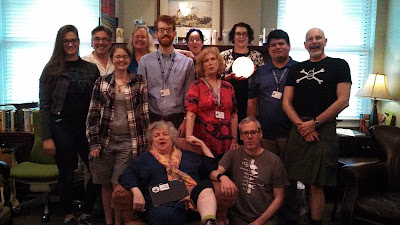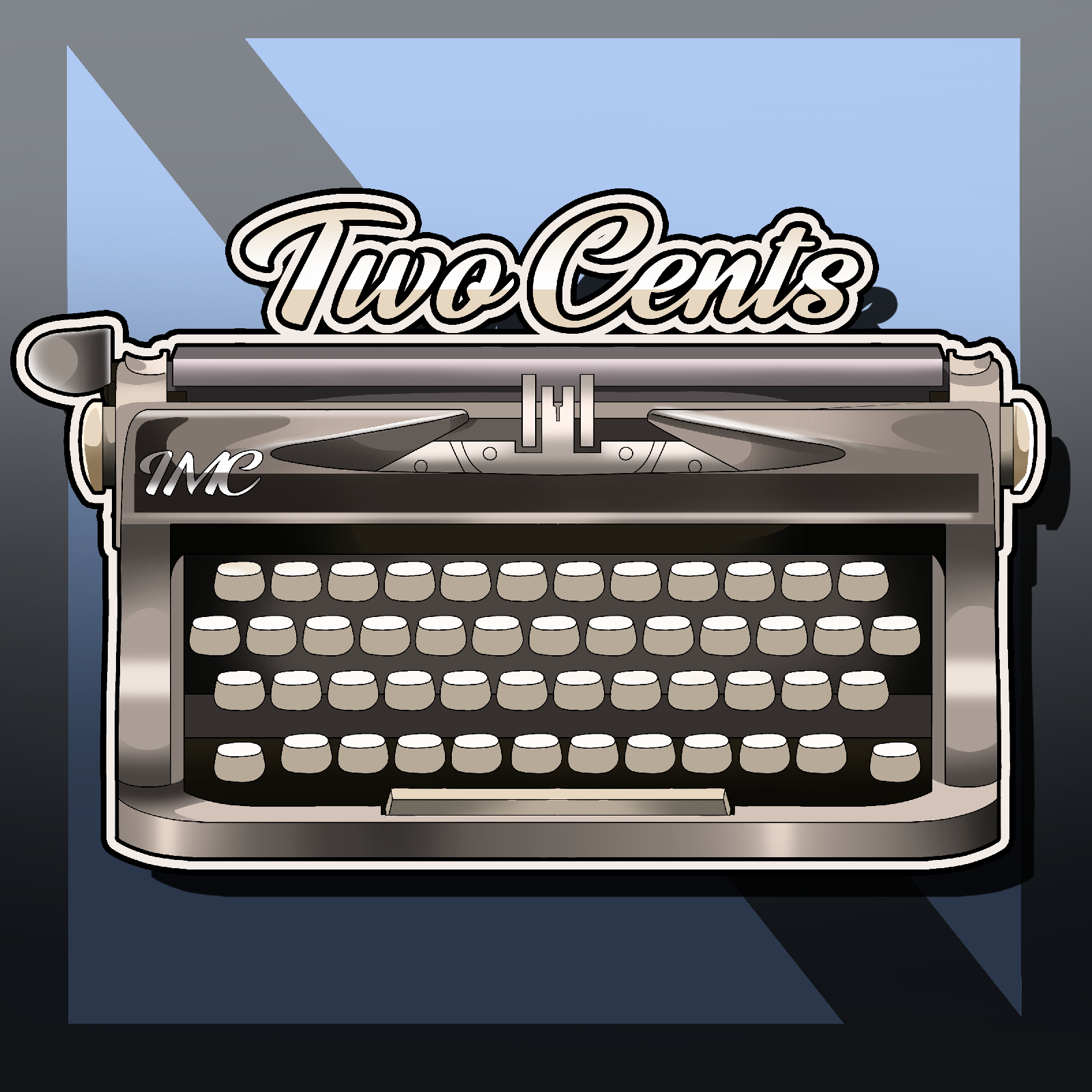Reporting Live From the Repeat Offenders
For the last week, I've been in Lawrence, Kansas because I've been attending the Gunn Center for the Study of Science Fiction's Repeat Offenders Writing Workshop. It's a two week workshop designed for slightly more advanced writers, who have also gone through the first Speculative Fiction Writing Workshop at least once (like yours truly).
Like all writing workshops, the heart of this one is the critique circle. Everyone submits stories to their peers so their peers can give insight into what's working in the story, what isn't working in the story, and also offer suggestions for how to address the perceived problems they've spotted. Doing so is what can give that little added boost to a piece that's nearly there but needs that extra push to get it over the publishable-finish line.
When critiquing, we practice the Milford Method of workshopping. Basically, everyone reads the stories beforehand, each of us making our comments and critiques of the manuscript as is. We then come into the circle and are each given three minutes to talk. During that time, we explain what we like and think works at present in the story, followed by explaining what we don't believe is working. Finally, we conclude by making suggestions for how to improve the piece. All the while, we also communicate that these propositions are indeed only suggestions, not hard and fast, mandatory changes.
However, just as important to the function of the workshop as the critique circle is the community of colleagues you create in such an environment. These people are folks who get what you're doing, who are familiar with the nomenclature of the work you're doing, and who want to see you succeed (whatever form that may take).
In addition to critiquing stories we've done before, we also help each other develop stories during aptly named Dev. Sessions. These situations work in the same way--I imagine--writer's rooms work. The developing writer first brings an embryonic idea to the table and explains what they have (also explaining what they want to keep, what they're on the ropes about, what they haven't thought of, etc.). Then we, the other writers, spitball questions at them that hopefully lead their thoughts down the trails that will bring the idea out of the developing stage and into the writing stage so they can eventually produce a draft we can later critique.
Of course, another major part of this two week experience--much to my surprise--are the events taking place for the 2019 Campbell Conference. I say, "much to my surprise," only because the conference is usually held during the transitional weekend between the first writing workshop and the RO workshop So coming back this year was a special treat for me.
The Campbell Conference is an annual gathering of writers and academics in the field of SF, who come together and talk shop. Each conference has a theme or subject around which all the events are structured. This year, the theme happened to be the life, work, and legacy of one of SF's great authors, Theodore Sturgeon.
In addition to several academics going into Sturgeon's work (his papers are actually housed in the Spencer Library here on the University of Kansas campus), Sturgeon's daughter and grandson attended this year to talk about the man and the writers and about his work. Sturgeon was one of the SF writers who was less interested in the development of technology in the future and more interested in how humanity and society would change in the future. Along with writers like Ray Bradbury, he was also a pioneer in the practice of paying attention to how writers write their stories, by employing a prose style that was vivid and lyrical.
In his life time, Sturgeon wrote a handful of novels, the most famous of which is a book called More Than Human, a story he expanded from a novella called Baby is Three. However, Sturgeon's true forte was the art of the short story. Before he passed in 1985, he produced nearly 200 short stories, all of which have been collected into a total of 13 volumes in recent years. It's for that mastery of a form that one of two awards given out by the conference every year is named in his honor.
The kick off event of the conference each year is an awards banquet. Food and conversation are followed by the awarding of the two prizes. This year, the Sturgeon Award for Best Short Story was awarded to Annalee Newitz, for her story "When Robot and Crow Saved East St. Louis" (a part of Illinois, as everyone said at the banquet, that desperately needs saving). In addition to the Sturgeon, the conference also confers the Campbell Award for Best SF Novel. This year, that award when to Sam J. Miller for his novel Blackfish City. Each of them was highly appreciative of their respective wins, as they should be. Good stories like the ones they told are what keep the field of SF alive and well.
We Repeat Offenders, of course, still have another week of critiques to get through. This first week, however, has been a highly eventful and stimulating one. I can only guess that this upcoming week will be just as enjoyable.
 |
| My Illustrious Colleagues, the 2018 Young Gunns |
When critiquing, we practice the Milford Method of workshopping. Basically, everyone reads the stories beforehand, each of us making our comments and critiques of the manuscript as is. We then come into the circle and are each given three minutes to talk. During that time, we explain what we like and think works at present in the story, followed by explaining what we don't believe is working. Finally, we conclude by making suggestions for how to improve the piece. All the while, we also communicate that these propositions are indeed only suggestions, not hard and fast, mandatory changes.
However, just as important to the function of the workshop as the critique circle is the community of colleagues you create in such an environment. These people are folks who get what you're doing, who are familiar with the nomenclature of the work you're doing, and who want to see you succeed (whatever form that may take).
In addition to critiquing stories we've done before, we also help each other develop stories during aptly named Dev. Sessions. These situations work in the same way--I imagine--writer's rooms work. The developing writer first brings an embryonic idea to the table and explains what they have (also explaining what they want to keep, what they're on the ropes about, what they haven't thought of, etc.). Then we, the other writers, spitball questions at them that hopefully lead their thoughts down the trails that will bring the idea out of the developing stage and into the writing stage so they can eventually produce a draft we can later critique.
 |
| Ted Sturgeon |
The Campbell Conference is an annual gathering of writers and academics in the field of SF, who come together and talk shop. Each conference has a theme or subject around which all the events are structured. This year, the theme happened to be the life, work, and legacy of one of SF's great authors, Theodore Sturgeon.
In addition to several academics going into Sturgeon's work (his papers are actually housed in the Spencer Library here on the University of Kansas campus), Sturgeon's daughter and grandson attended this year to talk about the man and the writers and about his work. Sturgeon was one of the SF writers who was less interested in the development of technology in the future and more interested in how humanity and society would change in the future. Along with writers like Ray Bradbury, he was also a pioneer in the practice of paying attention to how writers write their stories, by employing a prose style that was vivid and lyrical.
 |
Sam J. Miller,
2019 Campbell
Winner
|
In his life time, Sturgeon wrote a handful of novels, the most famous of which is a book called More Than Human, a story he expanded from a novella called Baby is Three. However, Sturgeon's true forte was the art of the short story. Before he passed in 1985, he produced nearly 200 short stories, all of which have been collected into a total of 13 volumes in recent years. It's for that mastery of a form that one of two awards given out by the conference every year is named in his honor.
 |
Annalee Newitz,
2019 Sturgeon
Winner
|
The kick off event of the conference each year is an awards banquet. Food and conversation are followed by the awarding of the two prizes. This year, the Sturgeon Award for Best Short Story was awarded to Annalee Newitz, for her story "When Robot and Crow Saved East St. Louis" (a part of Illinois, as everyone said at the banquet, that desperately needs saving). In addition to the Sturgeon, the conference also confers the Campbell Award for Best SF Novel. This year, that award when to Sam J. Miller for his novel Blackfish City. Each of them was highly appreciative of their respective wins, as they should be. Good stories like the ones they told are what keep the field of SF alive and well.
We Repeat Offenders, of course, still have another week of critiques to get through. This first week, however, has been a highly eventful and stimulating one. I can only guess that this upcoming week will be just as enjoyable.


Comments